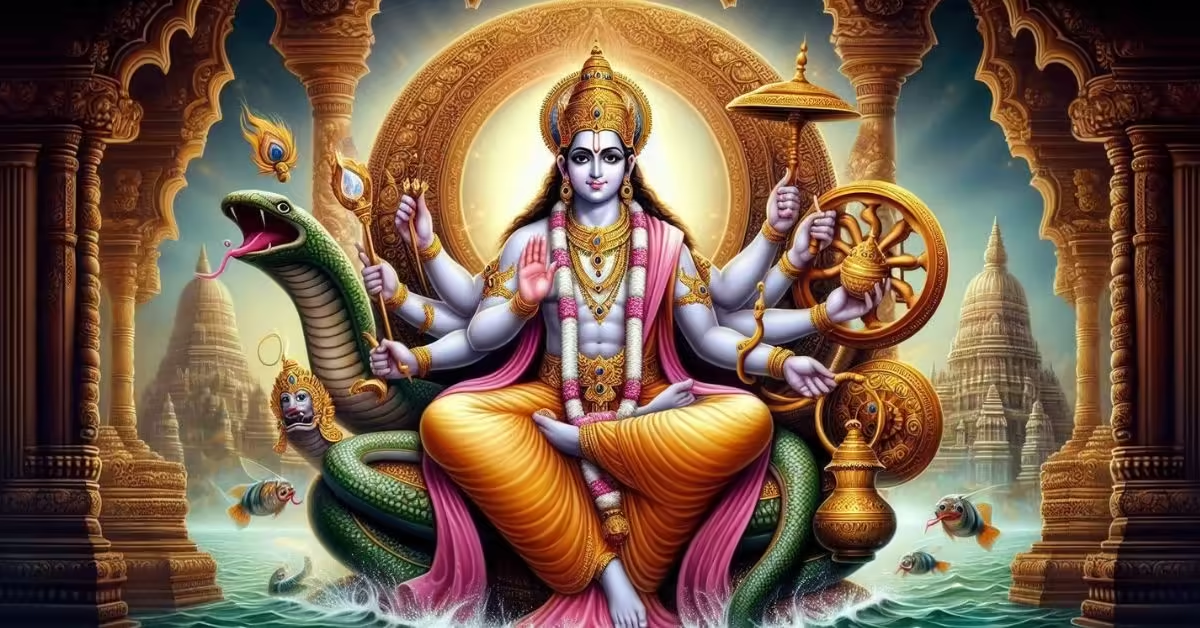And now The Dhanvantari, The present generation may not know about ‘Dhanvantari’. But in the rich tapestry of Hindu mythology, He holds a special place as the god of medicine and an incarnation of Lord Vishnu. His reference is heard in many colloquial stories in ancient Indian texts. According to Indian mythology, Dhanvantari is the Divine Physician. He is also known as the God of Ayurveda and Herbal Medicine. Here’s a closer look at the significance and worship of him.
The Birth of Dhanvantari
According to Hinduism, Lord Vishnu is said to have come to earth in the form of ten incarnations (avatars). In the emergence of the Kurma avatar (tortoise form), the second incarnation of it, the churning of the milky ocean (Ksheera sagara madhana), takes place. During the “Ksheera sagara madhana”, the gods and demons flocked to the ocean for nectar. Many divine things came out of the ocean, like diamonds, white elephants, divine trees, etc. After that, the time has come for the ultimate ‘the amrita (divine nectar).’ A divine figure came out of the ocean holding the amrita kalasha (nectar pot), having shining light around him. He is Dhanvantari!
Iconography and symbols
It is mentioned in the Puranas that at that time Lord Dhanvantari appeared with a divine nectar pot (amrita kalasha) in one hand, a conch shell in the other, a wheel in the other hand, and a leech in the other. According to Indian Puranas, He is actually an incarnation of Lord Vishnu. The word Dhanvantari means remover of suffering. His portrait is typically shown with a calm and serene demeanor, exuding a sense of compassion and healing energy. His four arms hold:
- Amrita Kalasha (the Pot of Nectar) symbolizes immortality and the essence of healing.
- Shankha (conch): Represents sound, creation, and purification.
- Chakra (Discus): Symbolizes protection and the destruction of evil.
- Jalooka (Leech): Reflects his expertise in medical treatments and the use of traditional healing techniques.
Dhanvantari in Ayurveda
Later, Dhanvantari was born in human form to cure the diseases of human beings on earth. Therefore, He laid the foundations of Ayurvedic medicine by telling how to use medicines equal to amrita. He expanded and divided Ayurvedic knowledge into a holistic science. He prepared many medicines with tree roots, stems, leaves, and flowers. With those divine medicines, he invented medicines that prevent many diseases, from small illnesses like cold and fever to major diseases like paralysis, jaundice, and cancer. He was the world’s first surgeon too.
Sushruta Samhita
Dhanwantari is also known as Vaidya Narayana. He holds information about the health of all living beings in his four hands. That is why he is considered the God of Ayurveda. He imparted surgical knowledge to Sushruta Acharya. Sushruta Acharya is considered the father of surgery. From Dhanvantari, Charaka expanded his ayurvedic knowledge. The Sushruta Samhita is an ancient Sanskrit text attributed to Sushruta, regarded as a foundational work of Ayurveda and one of the earliest treatises on surgery and medicine.
Worship and Festivals
Hindu mythology says that worshiping Dhanvantari will bring relief from several physical sufferings. One can worship him with his portrait or Lord Vishnu portrait. There is a festival called Dhanwantari Jayanti dedicated to him. celebrated two days before Diwali. He is worshipped by practitioners of Ayurveda and those seeking good health. Kerala (a state in India), which places great importance on medicine, has some ancient temples dedicated to him.
Mantra to Worship
There are also some special mantras to worship him. This is one of them.
‘Om Namo Bhagavate Vaasudevaaya Dhanvantaraye
Amrita Kalasa Hastaaya Sarvamaya Vinaasanaaya
Thrailokya Naathaya Sri Mahavishnave Namah’
(Salute to Dhanwantari, the form of Vishnu, who wears a divine nectar pot by his hand and dispels all diseases!)
Conclusion
Beyond Puranas and Ayurvedic texts, Dhanvantari’s influence extends into everyday life as well. His iconography and his teachings remind us of the deep connection between spirituality and healing. Worshiping him provides a holistic approach to the well-being that unites the body, mind, and soul.


